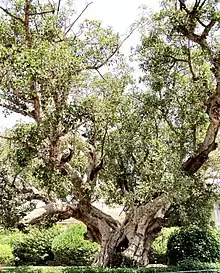שקמה
Hebrew

שקמה
Alternative forms
- שִׁיקְמָה (šiqmā́)
Noun
שִׁקְמָה • (šiqmā́) f (plural indefinite שְׁקָמִים, singular construct שִׁקְמַת־, plural construct שִׁקְמֵי־) [pattern: קִטְלָה]
- sycamore fig, a tree of the species Ficus sycomorus
- Amos 7:14, with translation of the Jewish Publication Society:
- וַיַּ֤עַן עָמוֹס֙ וַיֹּ֣אמֶר אֶל־אֲמַצְיָ֔ה לֹא־נָבִ֣יא אָנֹ֔כִי וְלֹ֥א בֶן־נָבִ֖יא אָנֹ֑כִי כִּי־בוֹקֵ֥ר אָנֹ֖כִי וּבוֹלֵ֥ס שִׁקְמִֽים׃
- Vay-yá'an Amós vay-yómer el Amatsyáh, lo naví anókhi v-lo ven naví anókhi ki boqér anókhi u-volés shiq'mím.
- Then answered Amos, and said to Amaziah: ‘I was no prophet, neither was I a prophet’s son; but I was a herdman, and a dresser of sycamore-trees.
- a. 217 C.E., Mishnah, Bava Batra 5:6:
- שְׁחַמְתִּית וְנִמְצֵאת לְבָנָה, לְבָנָה וְנִמְצֵאת שְׁחַמְתִּית, עֵצִים שֶׁל זַיִת וְנִמְצְאוּ שֶׁל שִׁקְמָה, שֶׁל שִׁקְמָה וְנִמְצְאוּ שֶׁל זַיִת, יַיִן וְנִמְצָא חֹמֶץ, חֹמֶץ וְנִמְצָא יַיִן, שְׁנֵיהֶם יְכוֹלִין לַחֲזֹר בָּהֶן:
- Sheḥamtít v-nimtsét levaná, levaná v-nimtsét Sheḥamtít, etzím shel záyit v-nimts'ú shel shiqmá, shel shiqmá v-nimts'ú shel záyit, yáyin v-nimtzá ḥómetz, ḥómetz v-nimtzá yáyin, shneihém yekholín laḥazór bahén.
- (If one was sold) red wheat and found white wheat, white wheat and found red wheat, wood of an olive tree and found that of a sycamore tree, that of a sycamore tree and found that of an olive tree, wine and found vinegar, vinegar and found wine, either one can recall the sale.
- a. 500 C.E., Babylonian Talmud, Ta'anit 29b:
- הַלּוֹקֵחַ אִילָן מֵחֲבֵרוֹ לָקוּץ מַגְבִּיהוֹ מִן הַקַּרְקַע טֶפַח וְקוֹצֵץ בְּסַדָּן הַשִּׁקְמָה שְׁנֵי טְפָחִים בִּבְתוּלַת הַשִּׁקְמָה שְׁלֹשָׁה טְפָחִים
- Ha-loqéaḥ ilán me-ḥavero laqúts, magbihó min ha-qarqá' ṭefaḥ v-qotsets. B'sadán ha-shiqmá, shnei ṭ'faḥim. Bi-vtulát ha-shiqmá, shlosha ṭ'faḥim.
- One who purchases a tree from a fellow to cut it down must raise his ax a handbreadth and chop there. In the case of a sycamore trunk, two handbreaths. In the case of an untrimmed sycamore, three handbreaths.
- Amos 7:14, with translation of the Jewish Publication Society:
Descendants
Further reading
 שקמה on the Hebrew Wikipedia.Wikipedia he
שקמה on the Hebrew Wikipedia.Wikipedia he
Anagrams
- משקה
This article is issued from Wiktionary. The text is licensed under Creative Commons - Attribution - Sharealike. Additional terms may apply for the media files.